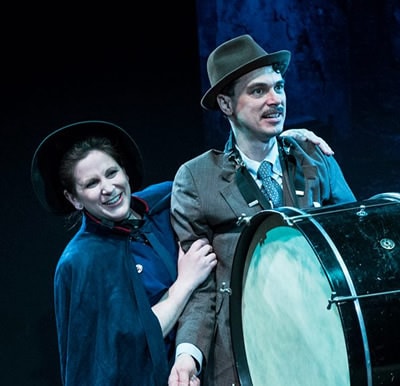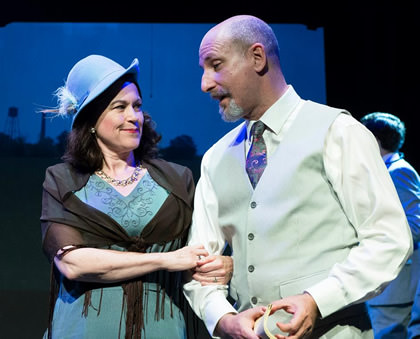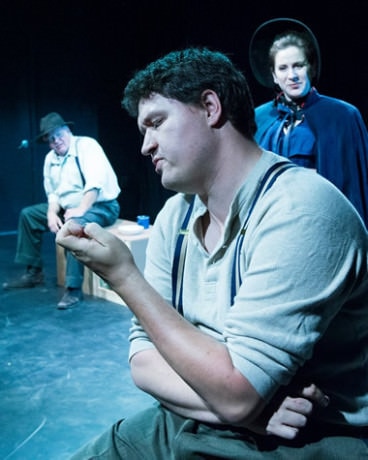Money Talks
The Pallas Theatre Collective’s Major Barbara is a captivating, thought-provoking comedy. The themes of class disparity, the necessity to compromise one’s values to survive, and the redemptive value (or not) of religion still pervade our everyday lives. Shaw’s perspective seemed to lean towards the practical; “Lack of money” he once said, “is the root of all evil.” The playwright’s views on politics are still relevant if cynical; “A government that robs Peter to pay Paul,” he notes, “can always depend on the support of Paul.”

Andrew Undershaft (David Dubov), a deceptively bland and well-mannered munitions baron, visits his family home after a long estrangement. “Food, clothing, firing, rent, taxes, respectability, and children,” he says. “Nothing can lift those seven millstones from Man’s neck but money; and the spirit cannot soar until the millstones are lifted.” As the play opens, the forceful and opinionated Mrs. Britomart Undershaft (Annette Mooney Wasno) explains to her son Stephen (Will Hawkins) that his long-absent father will be returning home, so that Mrs. Brit can convince him to choose his son as a successor, and incidentally to provide the financial support his two daughters will need. They are engaged to men who at the moment are members of the 99%.
Daughter Barbara, now Major Barbara, (Julia Morrisey) has joined the Salvation Army and become engaged to a Greek professor, Adolphus Cusins (Ian Blackwell Rogers). Cusins, whose character is partly based on Shaw’s friend, Gilbert Murray, the renowned classicist, has also joined the sin-no-more set and now beats the drum enthusiastically to win Barbara’s heart. Barbara’s sister Sarah (Kathleen Mason) plans to marry Charles Lomax (Axle Burtness) a kind of American Bertie Wooster, who will come into his millions some years hence.
As Undershaft, Dubov is full of self-satisfaction, utterly unashamed of his profession and heartily proud of his accomplishments. The actor has a kind of sweetness which makes his arguments in favor of death and destruction almost reasonable. He is touchingly gallant to his wife, and his love for his family is deep and true. As his wife, Annette Mooney Wasno is a commanding presence. She delivers her most amusing lines with a brusque efficiency, as if she herself were working on her husband’s assembly line. This accentuates the comedy, and makes her scenes with son Stephen full of fun. As Stephen, Will Hawkins is extremely entertaining, and has some particularly fine moments proclaiming that his America is exceptional in its character as well as its explosives.
Julia Morrisey as Barbara and Ian Blackwell Rogers as Adolphus are a winning couple. The evolution of their relationship is a pleasure to watch. Rogers has the unenviable task of turning a Greek professor into a plausible captain of industry, but his natural charm and instinctive grasp of necessity (drawn from his study of Greek tragedy no doubt) carry him through with dignity and style. He and Dubov play together beautifully, kindred spirits in their intelligence and drive to succeed. Kathleen Mason (Sarah Undershaft) and Axle Burtness (Charles Lomax) are a different kind of couple. She is astute and loves him in his idiocy; he is blissfully idiotic and crazy about her. Both turn in fine performances. Burtness deserves special kudos for finding American comedy in his extremely British lines.

The play is set in 1932 when the Bonus Army occupied Anacostia Flats across the river from the Capitol. The Great Depression raged, and thousands of desperate World War I veterans, some homeless or disabled, streamed into the city, seeking their “adjusted universal compensation” for wages lost while serving overseas. Clever politicians were able to label them as “bonus seekers” as if they were looking for more than they deserved. The bonus came in the form of government bonds, which would be paid out ultimately in 1945. But as the economic crisis worsened, the desperate veterans came to DC on freight trains, on old buses, sometimes with 20 people in dilapidated Fords, to lobby in person. They were well-behaved, setting up camps and receiving help from sympathetic locals, among them notables such as Evalyn Walsh McLean, owner of the Hope Diamond.
Ultimately the bill to award them their bonuses passed in the House but failed in the Senate. Many went home. Others were dispersed by police or the Army; shots were fired, tear gas was used. Two veterans were killed, and two babies died. Ferguson and Baltimore, of course, come to mind. The newsreels of the scene (available on the Encyclopedia Brittanica blog) were so disturbing the audiences began to boo them in movie theatres. “Heartless” Hoover was despised, and there would not be another Republican in the White House for thirty years.
In Major Barbara, the Salvation Army Shelter in Anacostia becomes part of the response to the Bonus Army crisis. Rummy Mitchens (Taunya Ferguson) and Snobby Price (Dane C. Petersen) two Washingtonians down on their luck, compare notes about the kindness of the Salvation Army ladies, describing how they exaggerate their previous sins to impress the Army and fill its increasingly empty coffers. Ferguson’s deep voice as Rummy is a wonder of nature, and Petersen as Snobby has just the right combination of wickedness and righteous indignation. He might be a cousin to Eliza’s father in My Fair Lady.
Steve Beall as Peter Shirley, who has been fired for being too old, and Loren Bray as Jenny Hill, the dedicated Salvation Army colleague of Major Barbara, display with perception and nuance the suffering they endure and the pride in themselves they still maintain.
Taunya Ferguson makes an astonishing transformation as she also plays the high-voiced Mrs. Baines, who runs the shelter, and whose spirituality is matched only by her ability to persuade others, or herself if necessary. As Bill Walker, who has come to the shelter to beat up and drag back his girlfriend, Brian McDermott is alternately menacing and down to earth, vicious and remorseful.
The script (adaptation by David Dubov and Dr. Michael Mullen O’Hara, President, International Shaw Society) has been quite successfully Americanized, for the most part, and the underlying allusions to the classics, such as The Bacchae by Euripides (Adolphus declaims a bit of the Gilbert Murray translation) blend together to synthesize Director Ty Hallmark’s vision.
The set, by Ty Hallmark and Clem Trott, is elegant when it is called for, and transforms seamlessly when needed into a Salvation Army shelter or the Undershaft ammunitions factory.
Projections Designer Jason Aufdem-Brinke uses photos of weapons, the Bonus Army, and other appropriate images to heighten the visual appeal of the set and occasionally add notes of irony. As Undershaft opines upon his Randian philosophy, we are looking at pictures of the bleak quarters of the Bonus Army. Lighting (Jason Aufdem-Brinke) and Sound (Kevin O’Connell) enhance the production, and the music adds to the period flavor. Costume Design by Brian J. Shaw (no relation?) is excellent; both flattering to the actors and revealing of character. Fights by Chris Niebling are well choreographed and executed.

Although Shaw is an intellectual playwright, his wit is as bright and amusing as ever. “If you can’t get rid of the skeleton in your closet,” he says, “you’d best teach it to dance.” It’s definitely worth a trip to Anacostia to sample more of Shaw’s ingenious paradoxes. After all, as Shaw reminds us, you never can tell.
Running Time: Two hours and 30 minutes, with one 15-minute intermission.
Major Barbara plays through May 31, 2015 at Pallas Theatre Collective performing at the Anacostia Arts Center — 1231 Good Hope Road, SE, in Washington, DC. For tickets, purchase them online.




